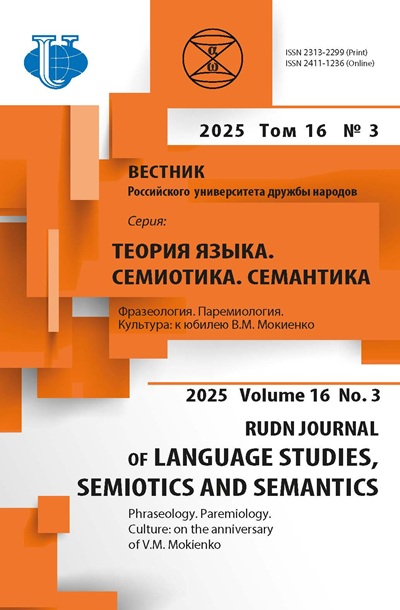Сeмантические трансформации при переводе немецкого дипломатического дискурса (на материале публичных выступлений Франка-Вальтера Штайнмайера)
- Авторы: Шапочкин Д.В.1
-
Учреждения:
- Тюменский государственный университет
- Выпуск: Том 9, № 1 (2018)
- Страницы: 93-104
- Раздел: ПОЛИТИЧЕСКАЯ ЛИНГВИСТИКА
- URL: https://journals.rudn.ru/semiotics-semantics/article/view/18270
- DOI: https://doi.org/10.22363/2313-2299-2018-9-1-93-104
- ID: 18270
Цитировать
Полный текст
Аннотация
Данная статья посвящена исследованию немецкого дипломатического дискурса как языкового феномена в ракурсе его перевода и передачи с помощью семантических трансформаций с немецкого языка на русский. В качестве материала исследования предстает дипломатический дискурс бывшего министра иностранных дел Германии Франка-Вальтера Штайнмайера (2005-2009 и 2013-2017), в результате анализа которого автор подтверждает гипотезу о том, что доминирующей семантической трансформацией при переводе дипломатического дискурса является модуляция, а переводчику при передаче дипломатических текстов необходимо уделять особое внимание уточнению смыслового развития и конкретизации, целостному преобразованию и контекстным синонимам. Помимо этого, опираясь на свое исследование, автор поясняет, что при переводе текстов дипломатического дискурса не применяется такой вид трансформации, как адаптация.
Ключевые слова
Об авторах
Дмитрий Владимирович Шапочкин
Тюменский государственный университет
Автор, ответственный за переписку.
Email: d.v.shapochkin@utmn.ru
SPIN-код: 6533-8793
кандидат филологических наук, доцент кафедры немецкой филологии Тюменского государственного университета; научные интересы: политическая лингвистика, теория дискурса, прагматика, перевод
ул. Володарского, 6, Тюмень, Россия, 625003Список литературы
- Алексеева И.С. Введение в переводоведение. М.: Академия, 2004.
- Большой немецко-русский и русско-немецкий словарь: http://dic.academic.ru/contents.nsf/ ger_rus.
- Волкова Т.А. Методика анализа дискурса в моделировании перевода дипломатических текстов // Политическая лингвистика. 2011. № 3.
- Выступление Федерального министра иностранных дел Германии Штайнмайера на заседании Совета министров иностранных дел ОБСЕ в Гамбурге 7 декабря 2016 г.: http://www.germania.diplo.de/Vertretung/russland/ru/08-politik/6-reden/bm-osze-hamburg.html.
- Выступление Федерального министра иностранных дел Франка-Вальтера Штайнмайера в Уральском Федеральном Университете: http://www.germania.diplo.de/Vertretung/russland/ ru/08-politik/6-reden/bm-jeka-2016.html.
- Гак В.Г. Языковые преобразования. М.: Школа «Языки русской культуры», 1998.
- Гарбовский Н.К. Теория перевода. М.: Изд-во Моск. ун-та, 2007.
- Гильченок Н.Л. Практикум по переводу с немецкого на русский. СПб.: КАРО, 2006.
- Кожетева А.С. Дипломатический дискурс как особая форма институционального дискурса // Научный Вестник Воронежского государственного архитектурно-строительного университета. Серия: Современные лингвистические и методико-дидактические исследования. Воронеж: Воронежский государственный архитектурно-строительный университет, 2014. № 1 (17). С. 54-63.
- Комиссаров В.Н. Общая теория перевода. М.: Высшая школа, 1999.
- Латышев Л.К. Технология перевода. М.: НВИ-ТЕЗАУРУС, 2000.
- Перезапуск контроля над вооружениями - больше безопасности для всех в Европе: http://www.germania.diplo.de/Vertretung/russland/ru/08-politik/6-reden/bm-namensartikel-faz-2016.html.
- Рецкер Я.И. Теория перевода и переводческая практика. Очерки лингвистической теории перевода. М.: Р.Валент, 2007.
- Das Deutsch-Russische Wörterbuch Zeitgenössischer Idiome: http://idioms_de_ru.academic.ru.
- Mehr Sicherheit für alle in Europa - Für einen Neustart der Rüstungskontrolle: https://www.auswaertiges-amt.de/DE/Infoservice/Presse/Interviews/2016/160826_BM_ FAZ.html?nn=382590.
- PONS: http://ru.pons.com.
- Rede von Außenminister Frank-Walter Steinmeier in der Eröffnungssitzung des OSZE-Ministerrates in Hamburg: http://www.germania.diplo.de/Vertretung/russland/de/__pr/mosk/ steinmeier-osze-08122016.html?archive=3485768.
- Rede von Außenminister Frank-Walter Steinmeier an der Ural Federal University Jekaterinburg: https://www.auswaertiges-amt.de/DE/Infoservice/Presse/Reden/2016/160815_BM_ Jekaterinburg.html.
Дополнительные файлы












